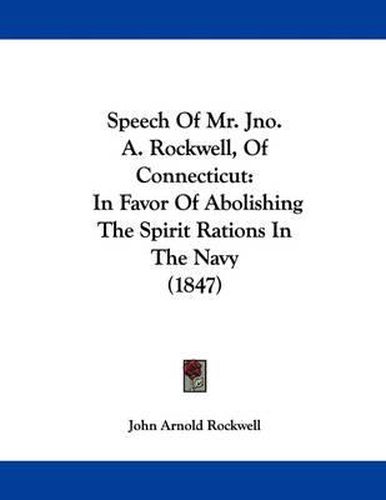Readings Newsletter
Become a Readings Member to make your shopping experience even easier.
Sign in or sign up for free!
You’re not far away from qualifying for FREE standard shipping within Australia
You’ve qualified for FREE standard shipping within Australia
The cart is loading…






""Speech of Mr. Jno. A. Rockwell, of Connecticut: In Favor of Abolishing the Spirit Rations in the Navy (1847)"" is a historical document that presents a speech given by John Arnold Rockwell, a member of the United States House of Representatives from Connecticut, in support of eliminating the spirit rations that were provided to sailors in the Navy. The speech was delivered on February 25, 1847, during a debate on a bill aimed at reforming the naval system.Rockwell argues that the spirit rations, which consisted of a daily allowance of rum or other alcoholic beverages, were causing more harm than good to the sailors. He cites various statistics and reports that show the negative effects of alcohol on the health, discipline, and overall efficiency of the Navy. He also points out that many sailors were becoming addicted to alcohol and that the spirit rations were contributing to the rise in desertions and other disciplinary issues.Rockwell proposes that the spirit rations should be replaced with healthier and more nutritious alternatives, such as coffee or tea. He also suggests that the Navy should provide better medical care and facilities to help sailors overcome their addiction to alcohol.Overall, ""Speech of Mr. Jno. A. Rockwell, of Connecticut: In Favor of Abolishing the Spirit Rations in the Navy (1847)"" provides a fascinating insight into the debates and discussions surrounding the use of alcohol in the Navy during the mid-19th century. It is a valuable resource for historians, researchers, and anyone interested in the history of the United States Navy.This scarce antiquarian book is a facsimile reprint of the old original and may contain some imperfections such as library marks and notations. Because we believe this work is culturally important, we have made it available as part of our commitment for protecting, preserving, and promoting the world's literature in affordable, high quality, modern editions, that are true to their original work.
$9.00 standard shipping within Australia
FREE standard shipping within Australia for orders over $100.00
Express & International shipping calculated at checkout
""Speech of Mr. Jno. A. Rockwell, of Connecticut: In Favor of Abolishing the Spirit Rations in the Navy (1847)"" is a historical document that presents a speech given by John Arnold Rockwell, a member of the United States House of Representatives from Connecticut, in support of eliminating the spirit rations that were provided to sailors in the Navy. The speech was delivered on February 25, 1847, during a debate on a bill aimed at reforming the naval system.Rockwell argues that the spirit rations, which consisted of a daily allowance of rum or other alcoholic beverages, were causing more harm than good to the sailors. He cites various statistics and reports that show the negative effects of alcohol on the health, discipline, and overall efficiency of the Navy. He also points out that many sailors were becoming addicted to alcohol and that the spirit rations were contributing to the rise in desertions and other disciplinary issues.Rockwell proposes that the spirit rations should be replaced with healthier and more nutritious alternatives, such as coffee or tea. He also suggests that the Navy should provide better medical care and facilities to help sailors overcome their addiction to alcohol.Overall, ""Speech of Mr. Jno. A. Rockwell, of Connecticut: In Favor of Abolishing the Spirit Rations in the Navy (1847)"" provides a fascinating insight into the debates and discussions surrounding the use of alcohol in the Navy during the mid-19th century. It is a valuable resource for historians, researchers, and anyone interested in the history of the United States Navy.This scarce antiquarian book is a facsimile reprint of the old original and may contain some imperfections such as library marks and notations. Because we believe this work is culturally important, we have made it available as part of our commitment for protecting, preserving, and promoting the world's literature in affordable, high quality, modern editions, that are true to their original work.